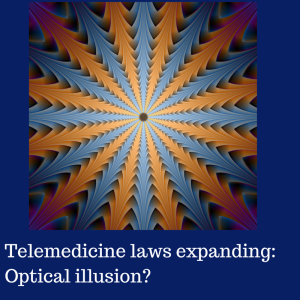Arkansas has a enacted statute encouraging telemedicine use. In Arkansas, SB 133, designed to “encourage the use of telemedicine,” advises all state agencies to evaluate and amend their policies and rules to remove regulatory barriers prohibiting the use of telemedici ne.”
ne.”
The bill amends Arkansas Title 17, Chapter 80, Subchapter 1, to add 17-80-117 (Telemedicine) and other provisions.
Significantly, “professional relationship” between doctor and patient is defined as one in which: (A) “healthcare professional has previously conducted an in-person examination and is available to provide appropriate follow-up care, when necessary, at medically necessary intervals,” (B) the healthcare professional “personally knows the patient and the patient’s relevant health status through an ongoing personal or professional relationship, and is available provide appropriate follow-up care, when necessary, at medically necessary intervals,” (C) there is a consultative relationship with the supervising physician, (D) there is an on-call or cross-coverage arrangement, or (E) other circumstances as defined.
Other provisions include:
- The usual standard of care applies (including when prescribing via telemedicine).
- Store-and-forward technology is not considered telemedicine.
- Laws relating to informed consent, privacy, medical record-keeping and confidentiality, and fraud and abuse (i.e., anti-kickback, self-referral, and fee-splitting laws) apply.
- A healthcare professional who provides only episodic consultation services is exempt.
Also, for companies offering telemedicine services, the new statute contains this interesting provision: “Simply providing information of a generic nature, not meant to be specific to an individual patient,” does not require a professional relationship.
At first glance, this looks like good news for national telemedicine operations – so long as they stick to providing “generic” information that is not specific to an individual patient.
It’s a bit of a Rorschach test or optical illusion – depending on how you look at it. On one hand, the new telemedicine statute expressly carves out and authorizes informational and educational services in the health and wellness arena. On the other hand, the language tightens the knot in the sense that the moment a telemedicine company gives advice “specific to an individual patient,” that’s considered telemedicine, and the requirement of a “professional relationship” kicks in (unless one of the exceptions applies).
The telemedicine statute also establishes that telemedicine visits be reimbursed at the same rate as an in-person visit. This includes both private health plans and Medicaid.
By way of comparison, Idaho’s HB 189, approved in the Idaho Senate, provides that if a provider offering telehealth services does not have an established provider-patient relationship, the provide can establish one “by use of two-way audio and visual interaction,” provided that the standard of care is satisfied. Emergency situations are excepted.
Prior to providing treatment (including a prescription drug order), the provider must obtain and document “a patient’s relevant clinical history and current symptoms to establish the diagnosis and identify underlying conditions and contraindications to the treatment recommended.”
Standard informed consent and medical record-keeping requirements apply.
Clearly, telemedicine laws–while expanding across the U.S.–remain a patchwork of rules. For example:
- Some require an initial good faith exam.
- Some specify that such an exam must be in-person.
- Some allow an online first exam.
- Some contain ambiguous language, leaving interpretation up to the Boards (or attorney predictions based on current practice and experience).
- Different states have different exceptions.
Conducting a nationwide telemedicine business is like navigating a road full of potholes.
Even though the Federation of State Medical Boards has proposed model legislation to govern telemedicine, and even though telemedicine laws and mandated telemedicine reimbursement are expanding, one still has to go state-by-state and figure out the rules to properly contour the operation.
It’s reasonable and practical to consult a Health lawyer when navigating this patchy terrain, as compliance with some of the esoteric, state-by-state requirements is the best way to stay off the regulatory radar, and on top of the market.

Contact our healthcare law and FDA attorneys for legal advice relevant to your healthcare venture.
Contact Us


